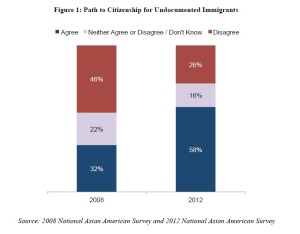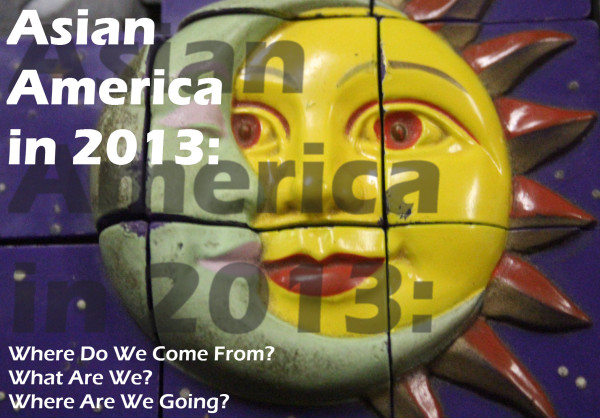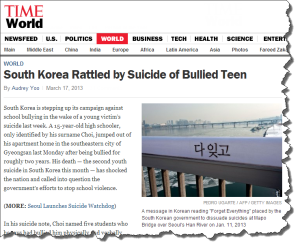I finally got to see Seeking Asian Female, the documentary film by San Francisco Bay Area-based director Debbie Lum. The film had debuted at South by South West (SXSW) last year and review by a fellow 8asians blogger Dino and has gotten a bit of press, including this nice interview with Lum on NPR last year.
However at CAAMFest 2013, this was the first opportunity I had to see the film with a live audience, which I very much wanted to do (instead of simply viewing a DVD screener). Note: this review contains spoilers.
A CAAMFest director noted that Seeking Asian Female was the second film at the festival to sell out after LINSANITY, the documentary film. I’m not surprised. Ever since my college days in the early days of the Internet on forums on USENET news, I recall the debates of “yellow fever.” The film’s Kickstarter page describes the documentary as:
“Seeking Asian Female is a feature-length personal documentary about the unlikely romance of Steven and Jianhua (a.k.a. “Sandy”) – an American man who is obsessed with marrying any Asian woman and the Chinese woman half his age who agrees over the Internet to be his fiancee. Debbie, a Chinese American filmmaker, documents with skepticism and humor, from the early stages of Steven’s search, through the moment Sandy steps foot in America for the first time, to a year into their precarious union…”
Lum’s initial intent was to explore why so many men (of all races, but primarily Caucasian/white men) had “yellow fever” – an interest in Asian women. In particular, the men she initially had interviewed had been American men who were interested in Asian women. However, Lum came across a twice-divorced man named Steven who had pursued interest in foreign Asian women overseas via dating and marriage sites on the Internet and his story was too good to be true that she decided to focus her film on Steven.
Steven was 60 years old with a son who had married an Asian woman, and had thought he’d might find happiness as well with an Asian woman. However, he was somewhat realistic that he did not offer a lot – he was old, not exactly in great shape, not very well-off living in a rented cramped and messy apartment, and had a dead end job being a parking toll collector at San Francisco International Airport (SFO). Surprisingly, Steven was honest with his dating profiles online given his situation.
At times, the audience as well as myself laughed at how ridiculous Steven’s obsession with Asian women had become – with him showing Lum his past subscribing to printed mail order bride catalogs an receiving them via “snail mail,” and later showing past letters, photos and images on his computer of past women he had dated or corresponded with. Steven came across with an adolescent innocence and enthusiasm with somewhat unrealistic expectations in what he would find in an Asian wife – with his general life a mess (and certainly his messy, cramped, crowded and apartment a metaphor for his life.) Best of all, as Lum notes within the documentary, Steven had no verbal filter and one is often amazed with the words and thoughts he is expressing coming out of his mouth.
Steven eventually finds the woman of his dreams, “Sandy,” a short, cute Chinese woman in her early 30s who came from a remote village and migrated to Shenzen, China to initially work in a factory and eventually work her way up to an office job. Being in her 30s, Sandy by Chinese standards is considered an undesirable woman by most men in China. Lacking any higher education, Sandy felt her options were limited and that Steven seemed genuine, despite his shortcomings. Steven visits Sandy once in China and proposes shortly after being on the trip. However, Sandy is a bit unsure. Eventually, Sandy visits and stays with Steven for a 3-month marriage visa.
With Sandy’s English quite limited, there is a huge communications gap – as well as expectations on both sides, between Sandy and Steven. There are a lot of up-and-downs, with plenty of fights, and at times one is never too sure whether or not Sandy’s intentions of marrying Steven are ever genuine. Steven begins to realize that getting married is not the end, but just the beginning, as he knows he will have to change and adapt from being a lonely loner to having to be a provider as well as clean up himself and his life, wracked with financial issues, past due debts and unrealistic expectations of a wallflower wife serving his every need without question.
The film was entertaining and very funny at times, and I thought Lum’s role as translator and marriage counselor was especially intriguing. Lum is self-admittedly not all that fluent in Chinese, but given her limited fluency in Mandarin Chinese, she does a noble effort (certainly better than what I could do).
Sandy certainly surprised me with her sincere interest and love in Steven and certainly did not necessarily play to the stereotypical green card wife – where a foreign woman would marry an American to obtain citizenship, and once doing so, get a divorce. But Sandy was realistic and did express such thoughts as her fantasy hit reality, but self-determined not to return to China to “lose face.”
By the end of the film, we see that the happy couple has survived their one year together as a married couple. During the Q&A session, Lum reveals that since the documentary was finished, Steven and Sandy have been married now for four years (coming this August 2013) – which amused and amazed the audience. Truly, if a man like Steven can find love over these crazy circumstances, there is certainly a woman out there for all of us. To be honest, if I were Steven, there is no way in hell I’d have any filmmaker follow me around and present myself like Steven has presented himself. It would be really, really, really interesting to meet Steven and Sandy in real life to see how their life together has transpired since the film.
The Q&A was equally interesting and entertaining where Lum gave an update on Steven and Sandy, as well as some background around the shaping of the film as well as her future project related to Seeking Asian Female:
I really did enjoy this film, though I was hoping that perhaps Lum could have explored more deeply the topic of “yellow fever.” In particular, I am definitely interested more in the American (white) male interest in Asian American women (as well as often the case, Asian American women’s preference for white men, often the exclusion of Asian American men.)
Lum had mentioned in her Q&A that she did indeed have hundreds of hours of footage to explore the topic of “yellow fever” and is kicking off her web project entitled “They’re [Asian women] All So Beautiful” – http://www.seekingasianfemale.com/sobeautiful/ and http://www.theyreallsobeautiful.com/
They’re All So Beautiful is a six-part web series that takes the conversation started in Seeking Asian Female, to the web forums. Each of the episodes, directed by Debbie Lum and co-produced by Maikiko James, begins with a question designed to stimulate discussion on yellow fever and stereotypes about Asian women.
- What is “yellow fever”? (April 1)
- Do you have to be white to have “yellow fever”? (April 8)
- What do Asian/American men think of “yellow fever”? (April 15)
- What about “white fever”–when Asian women seek out white Western men? (April 22)
- What about interracial marriage? (April 29)
- Seeking Asian Female (May 6) airs on PBS’s Independent Lens
I’m looking forward to seeing what unfolds during the web series, hopefully some thoughtful non-anonymous comments will be constructive on the topic.
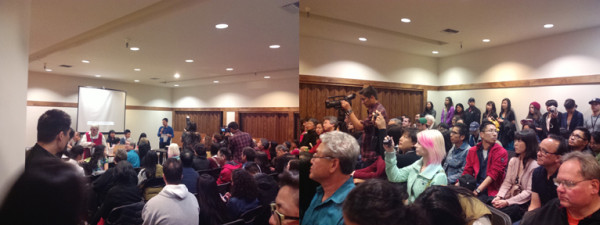
Unfortunately, I was unable to attend the following 90 minute panel discussion on the film moderated by Hyphen Magazine afterwards since the room was packed and I had to run off to another event.
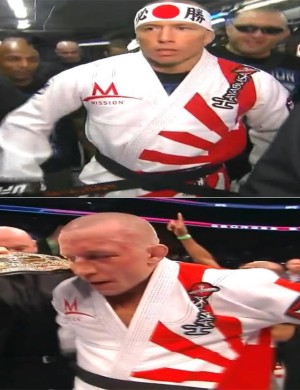 MMA fighter Chan Sung Jung (aka The Korean Zombie) has asked UFC Welterweight Champion Georges St. Pierre (aka GSP), to stop using the rising sun gi shown to the right. In an open letter posted on Jung’s FaceBook page, Jung says that the logo represents Japanese militarism and is offensive to Koreans and other Asians. Here is an excerpt:
MMA fighter Chan Sung Jung (aka The Korean Zombie) has asked UFC Welterweight Champion Georges St. Pierre (aka GSP), to stop using the rising sun gi shown to the right. In an open letter posted on Jung’s FaceBook page, Jung says that the logo represents Japanese militarism and is offensive to Koreans and other Asians. Here is an excerpt:

 I consider myself a professional Asian American, which means that I work in the “community.” There are positives and negatives that come with being a professional Asian American. The biggest negative is that people tend to rant at me about the state of Asian America and the worst part is they want me to agree with them. Well, I’m sick of being ranted at. It’s my turn to rant. This is my rant on Asian America right now:
I consider myself a professional Asian American, which means that I work in the “community.” There are positives and negatives that come with being a professional Asian American. The biggest negative is that people tend to rant at me about the state of Asian America and the worst part is they want me to agree with them. Well, I’m sick of being ranted at. It’s my turn to rant. This is my rant on Asian America right now: